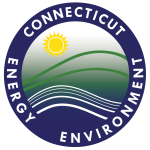Recycling
Recycling is an important part of managing solid waste to help reduce the use of raw materials, reduce air and water pollution, reduce energy consumption and lower greenhouse gas emissions which contribute to climate change.
Connecticut has a goal of diverting/reducing, reusing and recycling 60% of our municipal solid waste by the year 2024. Learn more about the 2016 Comprehensive Materials Management Strategy; visit RecycleCT - The RecycleCT Foundation is an organization to raise public awareness and participation in recycling; and remember to celebrate Connecticut Recycles Day on November 15th!

Its Origin
The original recycling symbol was designed in 1970 by Gary Anderson, a senior at the University of Southern California at Los Angeles, in response to a nationwide contest. The symbol is a Mobius strip or unending loop. Each arrow twists and turns itself, and all three arrows chase each other. It is a consummate representation of recycling.
Its Meaning
The three chasing arrows are a universal recycling symbol, internationally-recognized to designate that a material is either recyclable, or contains recycled materials. The use of the terms 'recycled' and 'recyclable', among others, and the display of the symbol is governed by the Federal Trade Commission's Guides for the Use of Environmental Marketing Claims.
The recycling symbol is a loop because recycling is an infinite process that can be repeated many times. The arrows in the recycling symbol represent the three steps of the recycling process:
 |
 |
 |
 |
- The first step is the collection and sorting. Recyclable materials are collected at the curb, drop-off facilities, and from businesses and then brought to facilities that separate the material. Plastic bottles are separated by types of plastic, aluminum is separated from steel, cardboard is separated from other paper and glass is separated by color (green, brown, blue and clear). Most materials (not glass) are baled and transported to the processing facility.
- The second step is manufacturing. The collected recyclable materials are transformed into new products. The materials may be used to create the same product, such as a new aluminum can from an old aluminum can; or a completely different product, like a park bench from plastic milk jugs.
- The third step is purchasing and use. These recycled products, aluminum cans or park benches, need to be purchased. This last part of the symbol; the third arrow, is closing the loop. Without this step, the recycling process is not finished.
We need to participate fully in the recycling process! In addition to putting our recyclables on the curb or bringing them to the recycling center, we need to buy products with recycled content too!
For more information, contact DEEP Recycling Program at 860-424-3366.
Reduce/Reuse/Recycle
Disclaimer: The Connecticut Department of Energy and Environmental Protection (DEEP) maintains the content on this web site to enhance public access to information and facilitate understanding of waste reduction, reuse and recycling. The DEEP is not recommending these resources over any others and recognizes these represent only a partial listing of resources on this subject.
Content Last Updated January 2020


